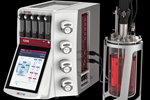Henkel Expands Additive Manufacturing Services
Henkel’s additive manufacturing services continues to support existing automotive and industrial customers from design to final part manufacturing.

Henkel engineer working with a customer to optimize 3D-printed part.
Henkel is expanding its additive manufacturing services, designed primarily for automotive and industrial customers, to provide support with 3D printable materials, from design to final part manufacturing.
Henkel additive manufacturing services will leverage the company’s sizable existing infrastructure and internal capabilities at strategically located application centers and at its certified plant in Richmond, Mo., which is already supplying millions of traditionally produced parts to a host of automotive and industrial customers.
These facilities meet and exceed exacting industrial standards including: OHSA 18001:2007, ISO/TS 16949:2006, EMS ISO 14001:2015 and ISO 9001:2015. This services offers a wide range of 3D printing capabilities including stereolithography, digital light processing, and multijet fusion, in addition to dedicated post-processing and finishing services.
“Within Henkel additive manufacturing services, we’re focused on providing additional support to our existing industrial customers, including OEM automotive manufacturers and their top suppliers,” said Simon Mawson, senior vice president and head of 3D printing. “They have very unique requirements, and we’re leveraging our vast material portfolio to help them build quality, repeatability and scalability into their additive manufacturing efforts. They want to produce end production parts, and our mission is to help them achieve that goal.”
The company says that its AM services works primarily with applications where parts are intended for ongoing, serial production. In addition to assisting with selecting and optimizing the right material for each part, the team can provide input early in the product development lifecycle, helping customers optimize their designs for function, surface finish, and to understand geometric dimensioning and tolerancing requirements. They also assist with part validation and other quality initiatives, including dimensional analysis of finished pieces.
“Knowledge of materials, and additive manufacturing workflows are critically important to the future success of 3D printing in a production environment,” said Chris Liddiard, market segment head automotive and industrial parts. “Equally important, and often overlooked is a knowledge of industrial customer requirement, APQP, exacting customer quality requirements, and seamless part ordering and delivery. Failure to control and manage all these factors can lead to a breakdown in customer supply chain. Henkel’s long history in producing and delivering traditionally manufactured parts as a Tier 1 to multiple industries, coupled with exciting material development in additive manufacturing is a powerful combination to lead the development of the production of reliable end use parts.”
Related Content
-
How Additive Manufacturing Can Help, not Hinder, Injection Moldability of New Designs
Four cost drivers—design for moldability, mold-base size, internal componentry, polish/custom finishing—dictate the financial and processing success of a molded part design. Learn how 3D printing can assist this process, while also understanding its potential pitfalls.
-
Production Tool, Prototype Time
Mantle's metal 3D printing technology targeted toolmaking and injection molders and moldmakers are taking notice.
-
Getting into Plastics Additive Manufacturing? Avoid these Six Common Errors
There are a lot of 3D printing technologies out there, and it’s not uncommon for processors new to additive manufacturing to get tripped up. Here are some typical snafus, along with advice on how to avoid them before you start making parts.















